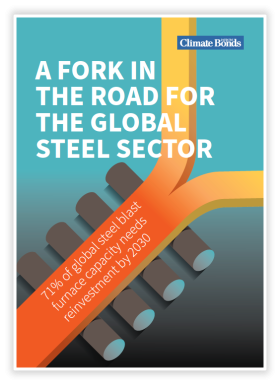The global steel sector has reached a fork in the road. Before 2030, 71% of existing coal-based blast furnaces (1090 Mt) will reach the end of its lifetime and require major reinvestment. As the next investment cycle won’t happen for another two decades, this means that this decade provides the critical opportunity for steel to transition to a more sustainable sector.
This policy paper included as part of the Climate Bonds Steel Package provides guidance to policymakers and regulators about how to guide industry and investors onto a climate-aligned pathway for steel.
Climate Bonds is working to mobilise the wide-scale transition of the economy in line with net-zero targets. All sectors of the economy will need to adjust to operate effectively in a low carbon economy. For many sectors – especially the high carbon emitting sectors like steel production – they may need to fundamentally reshape and transform their strategy in light of the challenges of a changing climate.
Coupled with the launch of this policy paper we have also launched Steel Criteria under the Climate Bonds Standard and Certification. By establishing standards for high emitting industries, Climate Bonds is seeking to provide clarity to investors looking to support credible transitions, as well as demonstrating best practices for producers aiming to decarbonise their industries. Together with ambitious and achievable policy recommendations, these resources are aimed at mobilising financial markets and industry leaders to make the emission reductions essential to preserving a 1.5°C future.
